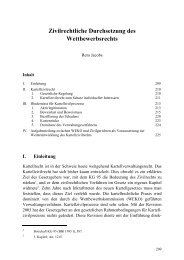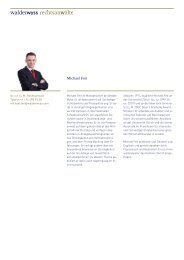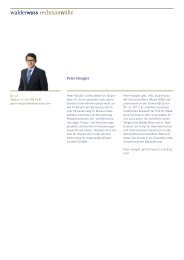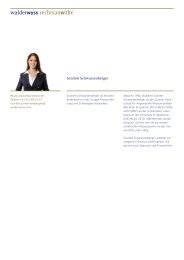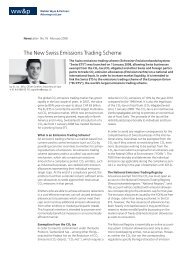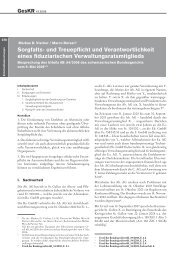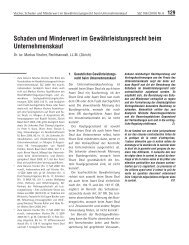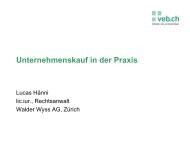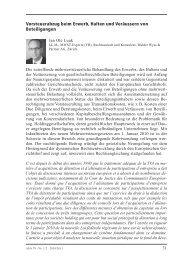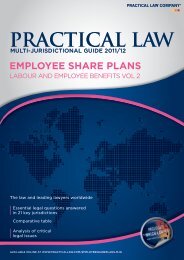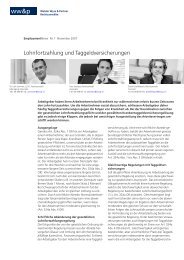Judgment of 7 March 2012 - Walder Wyss Ltd.
Judgment of 7 March 2012 - Walder Wyss Ltd.
Judgment of 7 March 2012 - Walder Wyss Ltd.
You also want an ePaper? Increase the reach of your titles
YUMPU automatically turns print PDFs into web optimized ePapers that Google loves.
A-6537/2010<br />
securities were sold. The SFTA contended that the sole purpose <strong>of</strong> these transactions was to<br />
obtain a fiscal advantage. In the opinion <strong>of</strong> the SFTA, not only was A.____________A/S not the<br />
beneficial owner <strong>of</strong> the dividends in question, but its actions also constitute an abuse <strong>of</strong> the<br />
Convention <strong>of</strong> 23 November 1973 between the Swiss Confederation and the Kingdom <strong>of</strong><br />
Denmark on the Avoidance <strong>of</strong> Double Taxation in respect <strong>of</strong> Taxes on Income and Wealth<br />
(DTC-DK, SR 0.672.931.41).<br />
J.<br />
On 13 September 2010 A.____________A/S (the complainant) lodged a complaint with the<br />
Federal Administrative Tribunal with the following motions:<br />
‘(1) That the tribunal enter into the complaint; in the alternative, that it be referred back to the SFTA<br />
to be handled as an opposition.<br />
(2) That sections 1 and 2 paragraph 2 <strong>of</strong> the contested order be set aside and the SFTA ordered to<br />
effect the refund <strong>of</strong> withholding tax as per the applications made using form 89 no 13855 <strong>of</strong> 2<br />
August 2007 in the amount <strong>of</strong> CHF (…), no 13856 <strong>of</strong> 2 August 2007 in the amount <strong>of</strong> CHF (…),<br />
no 13857 <strong>of</strong> 2 August 2007 in the amount <strong>of</strong> CHF (…) and no 279535 <strong>of</strong> 29 July 2008 in the<br />
amount <strong>of</strong> CHF (…) together with interest at the rate <strong>of</strong> 5% pa since 29 July 2010, in the alternative<br />
since 13 September 2010.<br />
(3) That section 2 paragraph 1 <strong>of</strong> the contested decree be set aside.<br />
(4) That the Federal Tax Administration be ordered to pay the costs <strong>of</strong> the proceedings to the<br />
complainant and to indemnify the complainant in respect <strong>of</strong> all legal costs incurred.’<br />
Further, the complainant submitted the following procedural motion:<br />
‘That a preliminary partial decision be handed down on prayer for relief 3 and be notified to the<br />
Parties in its operative language.’<br />
By way <strong>of</strong> justification the complainant argued essentially that there is now a very substantial<br />
market for swaps. According to a survey by the Bank for International Settlements, in 2008 the<br />
volume <strong>of</strong> equity-based over-the-counter derivatives exceeded USD 10,177bn. There were<br />
many sound reasons for investing in an equity swap as opposed to taking a direct investment in<br />
the underlying asset. In addition to avoiding stock market duties and disclosure obligations,<br />
economic commentators stressed the leverage this allowed. In any event the counterparties to<br />
the swap agreements had been residents <strong>of</strong> DTC countries. With regard to the possibility <strong>of</strong><br />
making allowance for the Swiss withholding tax against their pr<strong>of</strong>it taxes, the counterparties had<br />
made no tax savings at all from the total return swap.<br />
Furthermore, in terms <strong>of</strong> their timing the swap transactions were concentrated around the dates<br />
<strong>of</strong> annual general meetings. Given the Swiss companies’ lower public reporting obligations, this<br />
was largely due to the fact that the information investors needed could be found in the annual<br />
business reports. According to the complainant, equity swaps are internationally common<br />
derivatives that cannot on any account be described as unusual, inappropriate or abnormal.<br />
The complainant alone was responsible for the decision to hedge the transactions by acquiring<br />
the underlyings. Under the terms <strong>of</strong> the contract between it and the counterparty, payment <strong>of</strong><br />
the amount equivalent to the dividends had been independent <strong>of</strong> whether the corresponding<br />
dividend income was in fact received. Regardless <strong>of</strong> whether it had hedged the swap, at the<br />
time <strong>of</strong> the corresponding dividend decision the company had come under an obligation to pay<br />
Translation © <strong>Walder</strong> <strong>Wyss</strong> <strong>Ltd</strong>. 4 / 23



